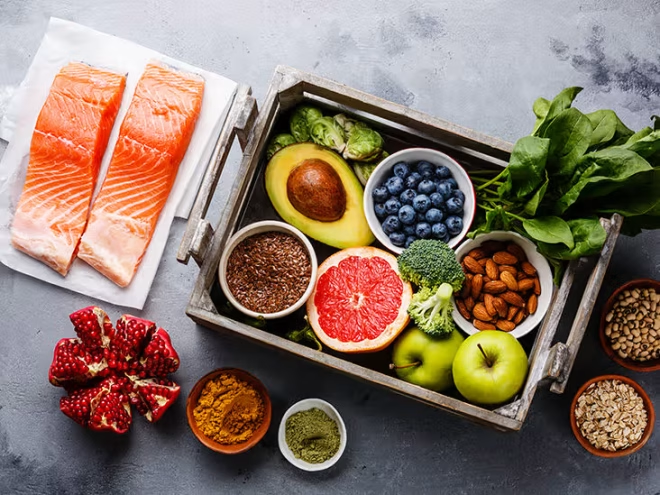
Vitamin D Foods to Boost Energy Levels
Vitamin D not only supports your immune system, it can also help prevent bone disease, regulate emotions, and more. Here’s how vitamin D is used for energy!
Vitamin D is often associated with strong bones. It’s one of 13 essential vitamins that help prevent bone diseases like osteoporosis and maintain muscle mass to reduce muscle stiffness and bone loss in the elderly. These nutrients also fight fatigue. You can take vitamin D for energy. All you need to do is soak up some sun, choose the right foods, and take supplements when needed, but don’t forget to combine this with good sleep, stress reduction, and physical activity to boost your energy.
What is Vitamin D?
It is an important nutrient that our body to synthesizes when our skin is exposed to sunlight. It is different from other vitamins due to its properties such as hormones that make it different in terms of structure and function. The active form of calcitriol directly affects many tissues and cells in the body.
As a vitamin and hormone, it affects gene expression in cells and regulates calcium, phosphorus and immunity. There are two important types of vitamins D2 and D3; D3 or cholecalciferol is thought to be more effective in increasing vitamin D levels in the body because it is used more. Vitamin D3 is synthesized in the skin after exposure to ultraviolet B rays and converted to its active form in the liver and kidneys. A similar metabolic process is required for D2 obtained from plants to become active.
According to the National Institutes of Health, people between the ages of 19 and 70 need 15 micrograms of vitamin D per day.

Sources of vitamin D
- Exposure to sunlight causes the production of vitamin D3. In general, just 10 to 30 minutes on bare skin in the middle of the day is enough, depending on skin type.
- Experts say that oily fish such as salmon, mackerel and sardines provide about 200 to 500 IU per serving.
- Eggs and offal
- Milk and plant-based milks, orange juice and cereals fortified with this vitamin.
- Some mushrooms, such as maitake and portobello mushrooms, can produce large amounts of vitamin D2 when exposed to sunlight or ultraviolet light.
- Vitamin D supplements are an effective way to maintain adequate levels, especially in people at risk of deficiency.
Vitamin D provides energy: Here’s how it helps
You need this vitamin for energy boost. A 2017 study published in the Journal of Medicine divided participants into two groups. Both participants experienced fatigue and were deficient in vitamin D. One group was given a vitamin D supplement, while the other was given a placebo. The group that took the vitamin D supplement saw improvements in energy levels within four weeks. Another study published in the journal Nutrients in January 2024 found that vitamin D supplementation may help reduce fatigue.
Vitamin D directly promotes energy and overall vitality by supporting the body’s vital functions. This is how vitamin D works to provide energy:
- Vitamin D supports calcium and phosphorus levels, strengthening bones and muscles, making work easier and reducing muscle stiffness.
- When the immune system is working well, the body uses less energy to fight off illness, meaning people don’t get tired.
- This vitamin affects the production of serotonin, helping to maintain a stable, happy mood, thus reducing mental fatigue and increasing energy.
- This nutrient helps control inflammation that can cause discomfort and fatigue.
Vitamin D for Energy: Tips to boost energy levels
1. Exposure to the sun
Try to stay in the sun for a short time without putting sunscreen on your hands or face, since your body produces this vitamin when bare skin is exposed to the sun. Sunscreen limits the production of this vitamin, but according to the National Institutes of Health, use sunscreen with an SPF of 15 or higher to prevent skin cancer.
2. Dietary improvement
On cloudy days or when you have asthma, the sun will hide in the clouds. When sunlight is limited, eat oily fish, energy-boosting foods, and eggs. Including them in your diet can provide additional vitamin D for energy.
3. Supplements
Vitamin D3 supplements (800 to 2000 international units) may be helpful for people who lack sunlight exposure or are at high risk of vitamin D3 deficiency. Do not just buy vitamin D for energy. Talk to your doctor before using any new supplement.
4. Routine blood tests
Regular blood tests for vitamin D levels can help you and your doctor decide on supplements and dietary changes. A blood test is necessary if you have bone pain, fatigue, and muscle weakness. These are some of the symptoms of vitamin D deficiency.
Lifestyle changes to be more energetic
Vitamin D is good for energy and lifestyle changes:
- Consume lean protein, complex carbohydrates and healthy fats to provide sustained energy from morning to night.
- Even mild dehydration can cause fatigue, so drink at least 2 litres of fluid a day, more if you exercise regularly or in hot weather.
- Exercise improves circulation, releases endorphins and clears your mind. Regular exercise, even in small amounts, can make a difference
- Good sleep is important for cellular repair and cognitive function. Plan to get at least seven hours of good sleep each night to feel better.
- Using techniques like mindfulness and meditation to manage stress can reduce mental fatigue. Taking regular breaks during the day and maintaining a balanced lifestyle can help reduce stress.
- A healthy diet is essential for maintaining health and boosting energy levels. But make sure you’re getting enough vitamin D for energy.

